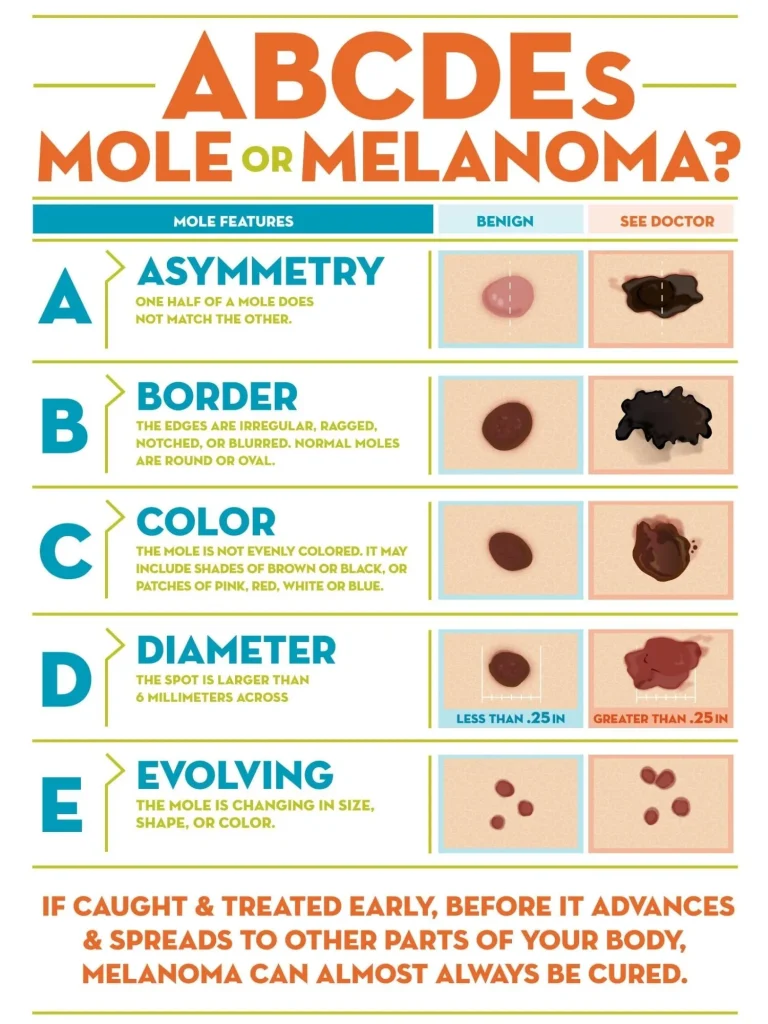Why it’s Important to Check Your Moles and the Potential Risk of Melanoma
Moles are common skin growths that can appear anywhere on your body. They are typically harmless, but it’s crucial to monitor them regularly to ensure they are not showing signs of malignancy, particularly melanoma. Melanoma is a type of skin cancer that can develop from abnormal moles, and early detection is key to successful treatment. If you notice any changes in your moles or have concerns about their appearance, it is essential to book an appointment for a mole check with a dermatologist for a thorough examination, including dermoscopy.

Understanding Moles and Their Characteristics
Moles, also known as nevi, are clusters of pigmented cells that appear as small, dark spots on the skin. They can vary in size, shape, and color, ranging from light brown to dark brown or black. Moles can be flat or raised and may have a smooth or rough texture. While most moles are harmless, it’s important to be aware of certain features that may indicate a risk of melanoma:
- Asymmetry: Normal moles are usually symmetrical, meaning one half mirrors the other. Suspicious moles may have irregular shapes or unevenly distributed pigmentation.
- Border Irregularity: Moles with blurry or jagged borders instead of smooth, well-defined edges should be examined by a dermatologist.
- Color Variation: Moles that display multiple colors or have shades of black, brown, red, white, or blue should be evaluated further.
- Diameter: Moles larger than the size of a pencil eraser (6 millimeters or more) may require professional assessment.
- Evolution: Any changes in size, shape, color, or texture of a mole over time should be promptly checked by a dermatologist [1]

Why Moles Can Become Malignant
Moles can potentially develop into melanoma, a dangerous form of skin cancer. Melanoma occurs when the pigment-producing cells in the skin, known as melanocytes, grow and multiply uncontrollably. While the exact cause of melanoma is not fully understood, there are several risk factors that can increase its likelihood:
- Sun Exposure: Prolonged and unprotected exposure to ultraviolet (UV) radiation from the sun or artificial tanning sources can contribute to the development of melanoma. This is something of special importance in Costa del Sol
- Family History: If you have a family history of melanoma, you may have an increased risk of developing the disease.
- Fair Skin: People with fair skin, light hair, and light-colored eyes are generally more susceptible to skin damage from UV radiation, making them more prone to melanoma.
- Moles: Individuals with a large number of moles or atypical moles have a higher risk of developing melanoma.
- Weakened Immune System: Those with a weakened immune system, whether due to organ transplantation, certain medical conditions, or medication, may be at an elevated risk.
The Importance of Booking an Mole Check with a Dermatologist
Regular self-examinations of your moles are essential, but they should always be complemented by professional evaluations. Dermatologists are trained to identify suspicious moles and assess their potential for malignancy accurately. Booking an appointment with a dermatologist will provide you with the following benefits:
- Expert Examination: A dermatologist will thoroughly examine your moles, considering their appearance, characteristics, and any changes you have observed.
- Early Detection: Dermatologists can identify early signs of melanoma that may be difficult to detect during self-examinations.
- Treatment Options: If a mole is found to be atypical or shows signs of melanoma, a dermatologist can guide you through the treatment process, which may involve surgical removal or further diagnostic tests.
Remember, when it comes to your skin, it’s better to be safe than sorry. If you have any concerns about your moles or notice any changes, don’t hesitate to book an appointment with Dr. Barranquero in Málaga, Fuengirola or Gibraltar. Early detection and prompt intervention are vital in ensuring the best possible outcomes for your skin health.

